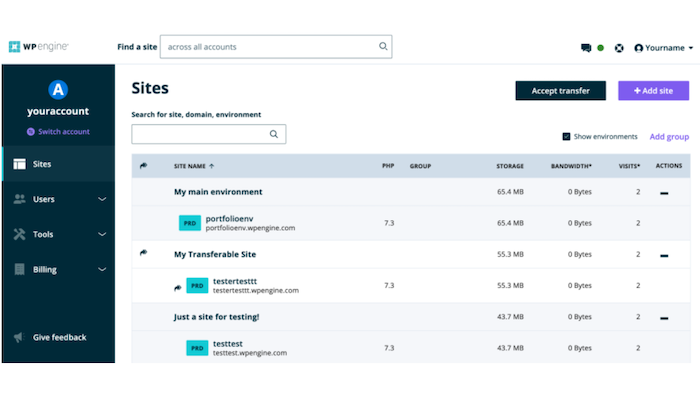
Disclosure: This content is reader-supported, which means if you click on some of our links that we may earn a commission.
I don’t want to think about how my WordPress works, I just want it to work.
Companies without managed WordPress hosting are on the hook for making sure everything is configured correctly. Technical tasks can pile up over time if people aren’t on top of the maintenance.
And then their site goes down. They lose revenue and spend precious time trying to figure out what’s wrong.
This is why I and so many other businesses use managed WordPress hosting. All the technical stuff is managed by the provider, the sites are blazing fast, and WordPress never goes down.
In the event that there is an issue, it’s resolved quickly by the managed WordPress hosting support team.
This ends up saving me tons of money, even if I now pay a higher dollar amount for managed hosting each month. Is the value there for you?
I’ve put together a list of my top options for managed WordPress hosting and a short guide to help you find the best one for your specific needs.
#1 – WP Engine Review — The Best Overall Managed WordPress Hosting

WP Engine was the first company to offer managed WordPress hosting and they continue to set the bar of excellence for the field. Every aspect of its IT environment has been optimized for WordPress.
As soon as companies move their sites to WP Engine, they report increased security, speed, and reliability.
The sticker price for WP Engine is higher than average, but it includes customer support from some of the most talented WordPress experts in the world.
WP Engine has a reputation for “just handling” issues. A customer identifies a problem or makes a request, and WP Engine’s support team gets it done.
It also includes many features that you might get stuck paying with for other plans.
There are 37 premium themes from StudioPress included free with WP Engine, for example. Even Kinsta, which is comparably priced, doesn’t have that.
WP Engine runs on Google Cloud Platform, which allows you to leverage nearly bottomless resources anywhere in the world. Basically, it’s running on the same global network that powers Gmail. That sounds fast and reliable to me.
You can also enable the cloud delivery network (CDN) to boost page load speed for users, wherever they are.
Some providers make you pay extra for a CDN, which spreads your content over a network of servers around the globe. With WP Engine, it’s built right in to every hosting plan they offer.
They also have partnerships with other companies like Cloudflare, AWS, and Let’s Encrypt. As such, you’ll always be able to support the latest technology in your stack.
Some of the notable features of WP Engine include:
- 55,000 WordPress plugins
- Automated SSL certificates
- Single sign-on authentication
- Development and staging environments
- Evercache
- Testing and debugging tools
- SSH Gateway
Pricing for WP Engine starts at $25 per month for their Startup plan, which supports a single site. With premium plans, you get more sites and more resources:

Because WP Engine consistently delivers best-in-breed features and services to their clients, the price is on the higher end. It’s built on Google technology, CDN is included free, and no other platform offers so many tools to shape your site.
People are thrilled paying for WP Engine. They shout about it from the digital rooftops. It’s feature-rich, fun to use, and comes with customer service that just makes your problems go away.
The fantastic 24/7 phone support is only available to Growth plans and above, which is too bad. But StartUp users still have access to 24/7 live chat, as well as phone support during business hours.
I recommend WP Engine highly for companies looking for the most hands-off managed WordPress hosting and best-in-class support. But if you’re looking for cPanel access and server control, you’re better off looking elsewhere.
Try out WP Engine today through its 60-day, money-back guarantee, which gives you enough time to really see if the value is there. If it’s not, no money lost.
#2 – Bluehost Review — The Best for Brand-New WordPress Sites
Bluehost’s web hosting plans always strike a great balance between price and value, including its managed WordPress hosting plan known as WP Pro.
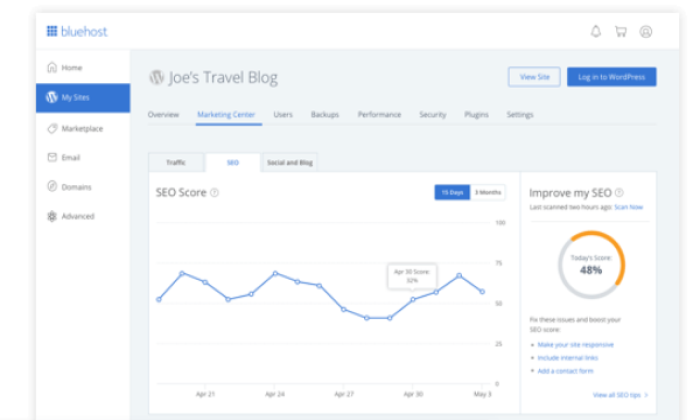
It’s an excellent choice for people who are building a new site and want everything done right the first time.
Some companies are moving to a managed WordPress after years of taking care of their own site. Others need to use the platform without having messed around with it before, and Bluehost meets these users where they are.
Bluehost is one of only three providers that’s recommended by WordPress officially. One of the main reasons is the level of support they provide their customers.
After signing up for WP Pro, there’s a 1-hour concierge call where a WordPress expert walks you through the setup. They can help get plugins and themes installed, answer any questions, and make sure you are ready to go.
When something happens down the line, Bluehost offers live chat and telephone customer support 24/7.
These on-demand support resources are critical to people starting out.
This is not lipstick-on-a-pig managed WordPress hosting, even if Bluehost is known for some of the best non-managed WordPress web hosting plans out there.
Bluehost runs WP Pro on low-density servers dedicated to WordPress. This means faster loading speeds and increased security.
WP Pro is not as mature a platform as WP Engine or Kinsta. A WordPress power user might feel like there are some missing features. But those newer to the platform are likely to be impressed by what’s included:
- Automatic updates
- Daily backups
- Global CDN
- Site staging
- Malware detection and removal
- Free SSL for all sites
- Free domain name (1 year)
- SiteLock malware detection and removal
All of these features come with any of the three plans for WP Pro, which start at $19.95 per month for the Build plan.
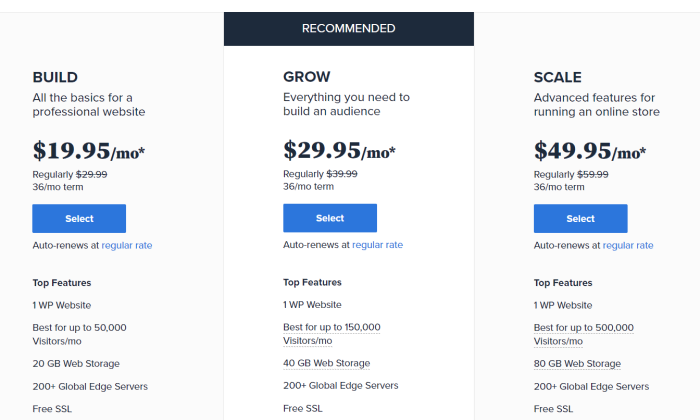
Build is more than enough to help any business get off the ground, coming with an extremely generous 30 GB of storage. That’s three times as much storage as WP Engine and Kinsta offer, at a lower price to boot.
With Grow and Scale, Bluehost provides additional support features, as well as tools for SEO, video compression, and PayPal integration. Note that you will only be able to use the premium features for a single site, even if you build out multiple.
This is a major difference, as higher-tier plans with other providers let you manage multiple sites with one plan. For people just starting off with one site, though, Bluehost offers a wide array of resources at the best price.
Bluehost has the dedicated servers and in-house caching system necessary to give your WordPress sites the edge in performance. It can’t match Nexcess or WP Engine for the depth of WordPress specific features, but that may not be so important for your new site.
Bluehost gives you plenty of tools to get a beautiful WordPress site up and running in no time. And because WP Pro is relatively new, you don’t have to worry about legacy problems or technology. Everything’s been built for today’s cloud.
Visit Bluehost today to find out if WP Pro is the total package you are looking for.
#3 – Nexcess Review — The Best for Ecommerce Sites
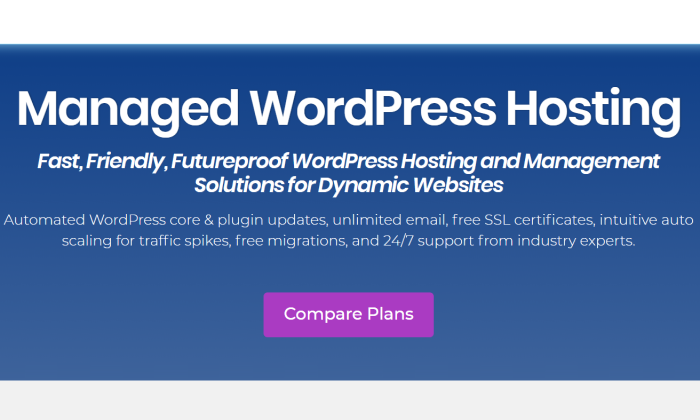
Nexcess is a very mature provider with hosting solutions for a variety of platforms and needs. Its managed WordPress hosting is a very powerful option for companies in ecommerce because it can handle the needs of today’s dynamic websites.
First off, Nexcess comes with a lot more bandwidth per dollar than any other provider. Even their entry level plan comes with 2 TB of bandwidth, which leaves other options in the dust.
This is a big deal for ecommerce, membership sites, and people who sell courses online. They simply cannot function with limited bandwidth.
On top of that, the Nexcess CDN uses advanced caching and compression features to deliver content quickly without affecting quality. This is really important for companies putting up images for products and services.
If, for example, you forget to compress an image before uploading it to a page, the large files could slow load times down considerably. Nexcess automatically compresses and optimizes the images you upload.
In addition to the generous bandwidth allowances, Nexcess plans come with a relatively large amount of storage. The automatic image optimization means that companies can use this extra space efficiently, avoiding overages and keeping site speed at top levels.
Every managed WordPress hosting plan from Nexcess comes with every feature and 24/7/365 support by phone, live chat, or email.
Smaller businesses get access to everything that enterprise clients do, which is an incredible benefit to companies looking to aggressively break into the market.
Like other managed providers, Nexcess has dedicated a lot of effort to ensuring that the backend IT environment is optimized for WordPress. Unlike the others, however, Nexcess supports additional platforms, like Magneto and BigCommerce.
This provides a lot more flexibility to companies who use more channels than just WordPress to reach their customers.
Some of the standout features that come with any Nexcess managed WordPress hosting plan include:
- Free SSL certificates for every site
- Email included
- Daily backups
- Plugin updates
- Staging environment
- Stencil sites (site cloning)
- Visual regression testing
Whether you are a freelance WordPress developer building ecommerce sites for clients, or an enterprise looking to support dozens of dynamic online shopping venues, Nexcess has a plan to fit your needs:
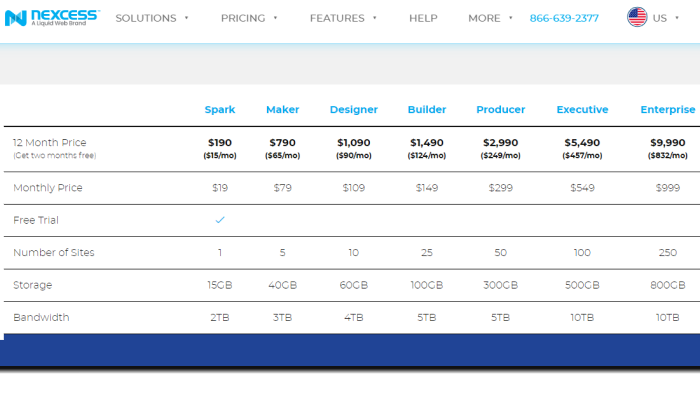
Looking at the entry level plan, Spark, you get 15 GB of storage and 2 TB of bandwidth for $15/month. The storage is generous, and no one else offers that much bandwidth for that low a rate.
The Maker plan is $65/month. That’s comparable to Kinsta’s Pro plan in price, but you can create 10 websites in Nexcess Maker, compared to the Kinsta Pro plan’s limit of two.
Like other providers, Nexcess will auto-scale your resources to meet demand. Where they stand out is not charging you for the first 24 hours of a traffic surge.
In short, ecommerce providers are set up for success on Nexcess. They take care of every WordPress core update and update all your plugins automatically. With most other platforms, automatic plugin updates are an add-on expense.
Try Nexcess for managed WordPress hosting free for 14 days. If you decide to sign up for the platform, there’s still a 30-day money-back guarantee for any paid plan.
#4 – Kinsta Review — Best WP Engine Alternative
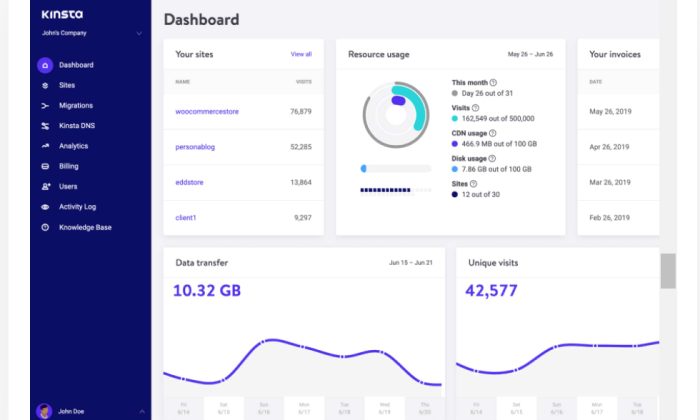
Kinsta is a premium managed WordPress hosting solution that’s trusted by the biggest businesses with the most demanding website needs. Large traffic? High availability? No problem.
Tripadvisor needs dynamic pages for virtually every city in the world. Intuit, owner of TurboTax and QuickBooks, needs incredibly secure pages to serve millions of unique users.
Both of these companies trust Kinsta to get the job done.
Like WP Engine, Kinsta is built on Google Cloud Platform, but they do it a little differently. Kinsta uses LXD managed hosts to house each site in its own container.
The benefits of this include increased security and stability, because each container is isolated and contains everything it needs to run on its own. It also makes upgrading plans much easier. Instead of having to migrate from shared hosting to VPS, for example, all Kinsta clients get the same core infrastructure.
You can certainly get containers set up in WP Engine, but with Kinsta, it’s the default setting. All the benefits, no extra work.
One really helpful hands-off feature from Kinsta is their self-healing technology. It checks the status of your PHP service every minute. If it’s down, Kinsta will automatically attempt to start it back up.
Kinsta will also automatically fine-tune your WordPres databases based on the needs of your site. Each week, without having to lift a finger, Kinsta optimizes your database to optimize performance.
There’s dozens of such time-saving features baked into Kinsta, such as:
- Daily and on-demand backups
- Staging environment
- Hack and malware removal
- Multi-site, multi-user support
- Free SSL certificates
- SSH access
- Site cloning
- Application performance monitoring
It’s very helpful to be able to create manual backup points when you are about to install a plugin or try something new. This way, you can backup right to where you left off, instead of having to revert your site back to the day before.
Kinsta offers a tremendous range of plans. Because it’s built on containers in Google Cloud, companies can scale up or down seamlessly as resource needs change. There are no fixed-term contracts and no penalties for changing plans.

In addition to those shown above, Kinsta offers five more plans for larger businesses and enterprises. No matter which plan you pick, you are going to get the full range of features and capabilities.
Starter plans come with one premium migration, which means you fill out a form and Kinsta engineers do the rest. Higher tier plans come with more premium migrations.
Kinsta is definitely on the higher end in terms of price, but 24/7 live chat and ticket-based support is included with every plan.
The company doesn’t provide phone support, which can sound off putting at first. They are clear about their reasons, though. And, judging from the rave reviews about Kinsta’s customer support, their system is keeping people happy.
Kinsta won’t allow you to use caching plugins, but it’s not really a downside. The platform has built-in caching, which works better than the front-end plugins, as well as their own proprietary caching plugin.
In other words, Kinsta users don’t have to worry about caching themselves. It’s just one of the many elements of WordPress that works flawlessly with zero effort.
Kinsta offers a 30-day money-back guarantee, which is shorter than WP Engine’s two-month trial. But that should give you enough of a chance to see which platform works better.
#5 – Flywheel Review — The Best for SMBs that Sell WordPress Sites
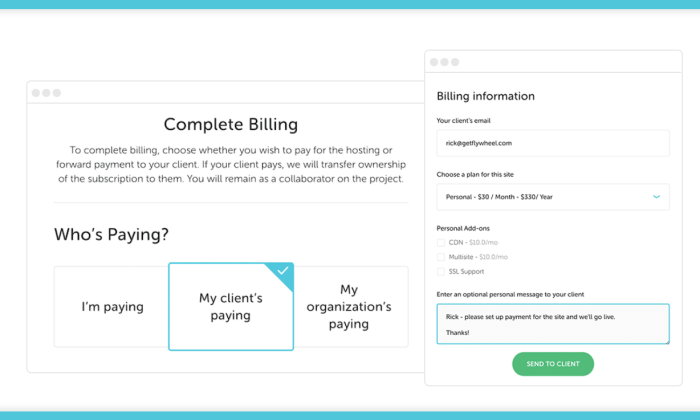
Flywheel offers a managed WordPress solution that is beloved by developers and agencies who build amazing sites for their customers.
It starts with an IT environment that’s been configured perfectly for top-notch WordPress performance. Like Kinsta and WP Engine, Flywheel is built on Google Cloud, so it delivers excellent uptime and availability.
You never have to worry about page load times or site speed. There’s server-side caching, access to a CDN that allows full page caching, and FlyCache, the company’s proprietary caching engine. With FlyCache, caching exclusions are automatically applied to WordPress plugins, which is one less thing you have to do to keep the site optimized.
FlyCache also refreshes automatically to ensure that visitors are only seeing the latest content. All of this is going on behind the scenes, constantly improving each site’s performance.
Designing eye-catching websites is a breeze with Flywheel. There are more than 30 premium StudioPress themes included with every plan, which can be tweaked and customized to match a client’s wishes.
Free demo sites are another one of the standout features from Flywheel that really empowers creatives. Create a new site for free, stage it for up to 14 days, and only pay when it goes live.
This way, teams can show production-ready products without having to maintain a server for demos. You can purchase extra sites for $20 at any time without having to upgrade to a different plan, if the demo site restrictions don’t fit with your needs.
Flywheel also makes it incredibly easy to transfer billing of the sites you build for customers. With one click, the customer owns the site, but you and your team retain full access. There’s no confusion from having to share accounts or passwords.
Site cloning comes with every Flywheel plan, whereas others include this feature only at premium tiers. This allows teams to quickly generate and modify sites for sale.
A potential customer reaches out and says, “I saw the amazing work you did for that brand. We want it.” With Flywheel, you can invite them to check out that new site out in no time flat.
Some of the other helpful features include:
- Nightly backups
- Malware detection and removal
- Free SSL for every site
- Staging environment
- SSH gateway
Pricing for Flywheel is unusually flexible compared to other providers This makes it an appealing choice for freelancers and SMBs who may still be figuring out their unpredictable resource needs:
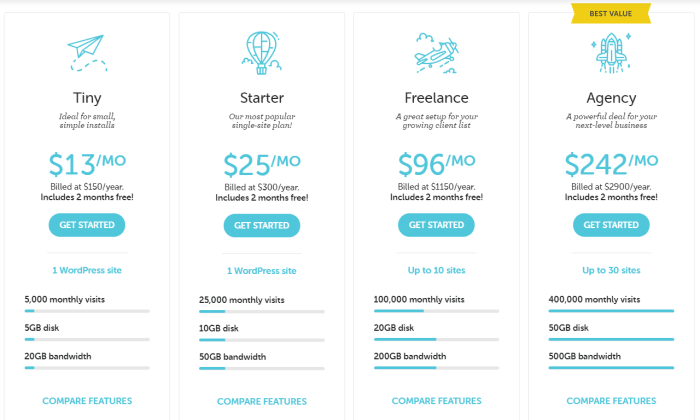
The Tiny plan is fairly unique among managed WordPress options. Yes, you get what you pay for in terms of limited bandwidth and storage, but the feature set is virtually identical to the higher-tier plans.
This can provide an incredible amount of power to a freelance WordPress developer or a smaller business that wants to reap the benefits without the big spend.
There’s 24/7 live chat included with every plan, but phone support only comes with the Agency plan.
That said, Flywheel automatically renews SSL certificates, which is a time-saver and boost to security. Other hosts may require you to do this on your own, which can cause issues if you have a number of sites to manage, or have sold to clients.
They also provide a rich selection of online resources, which make it easy for Flywheel users to answer questions quickly on their own and build their knowledge.
The storage and bandwidth limits for Flywheel aren’t super generous, and there are overage fees if you have too many visitors or use too much space.
But the platform truly handles everything on it’s own. There’s no need for third-party backups, purchasing SSLs, and you’ll never have to touch cPanel again.
More than anything, there is no provider that makes it as easy as Flywheel to transfer billing and maintain control of the sites you sell.
Try your first WordPress site free on Flywheel for 14 days. If it works out well, rest assured that you can find a Flywheel plan that fits your needs.
What I Looked At To Find The Best Managed WordPress Hosting
A true managed plan lets companies focus on building their sites in WordPress and ignore the hosting.
You’re not going to have to mess around with updates, backups, caching, and getting the settings just right. The provider takes care of all of that, letting your team focus on creating great content.
One quick “buyer beware” moment should be mentioned, though.
You’re going to see some options marketed as “managed WordPress hosting” that are essentially regular old hosting. Yes, there’s a new interface that takes the place of cPanel and it might make it easier to manage your WordPress server…
…But, with these types of “managed” WordPress plans, you’re still on the hook for a lot of the basic WordPress upkeep.
You didn’t Google “managed WordPress hosting” for that, right?
It’s like ordering a meal in a restaurant only to find out your help is needed in the kitchen.
Some of the basic things a managed plan needs to cover include:
- Automatic daily backups
- One-click manual backups
- WordPress Core Updates
- Malware detection and removal
- Security fixes and patches
- 24/7 support
I want those constant security fixes without any work whatsoever on my part. Same goes for backups and updates. And if something goes wrong, I need to know I have a channel to reach out any time of day.
The good news is I didn’t include faux-managed plans in my list. All these providers are the real McCoy, trusted by WordPress and thousands of happy businesses.
Still, among the best managed WordPress hosting options, there are some important differences. Chances are that one of these plans is a better fit for your needs than the others.
Let’s walk through the major criteria you need to consider in order to make an informed decision about which one is going to work best for your needs.
Resources at the Right Price
A managed WordPress plan is ideal for companies that are trying to get the most value from every dollar spent. Spending more isn’t an issue so long as the value is there.
That said, the way that managed WordPress providers charge for resources varies considerably. This matters now, and in the future should you need to upgrade your plan in order to support your site.
For one thing, annual contracts are a better bargain than paying month-to-month. More importantly, it will be way less stressful if you can stick with the same provider for a long time. Having to migrate a business critical WordPress can easily cause problems, to put it lightly.
The biggest resource differentiators are storage space, bandwidth, and the number of websites you can build. With WP Engine, the plans break down like this:
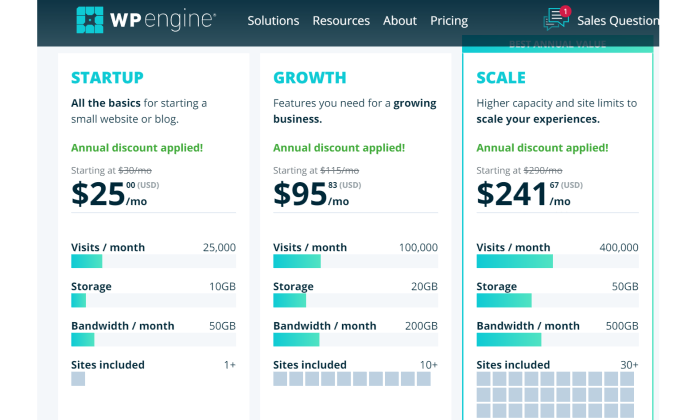
It’s pretty straight-forward: more sites, bandwidth, and storage with higher-tier plans. But when you go to compare different providers, it’s not apples to apples.
Consider how Nexcess allocates resources to their different managed WordPress plans:
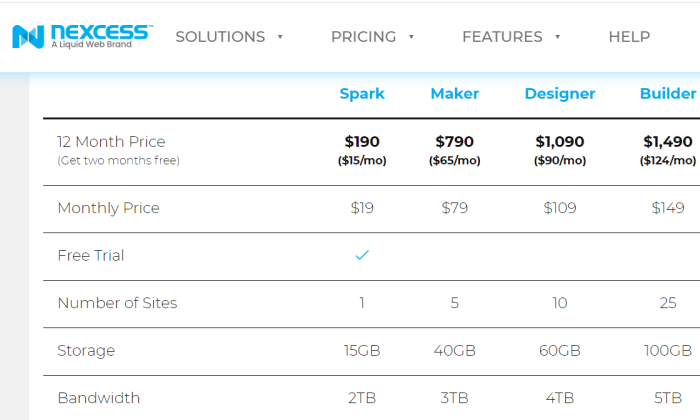
Even at Nexcess’ lowest plan, Spark, there’s 2 TB of bandwidth included. That’s 40x as much as WP Engine includes with its base-tier plan.
For businesses expecting tons of traffic, Nexcess may be a smart long term decision based on the generous bandwidth limits.
Resource limits are not the only thing to consider, but you want to be aware of them, how they line up with your long-term needs.
This is especially important to businesses who create and sell WordPress sites, as their customers will be on the hook for footing the bill.
Hitting these limits unexpectedly can cause issues and cost money, and the people who are buying sites may be on a different budget universes when it comes to hosting costs.
Speed You Need
In addition to taking the maintenance out of the equation, a good managed WordPress host will ensure that their IT environment is built to deliver fast, reliable results.
Kinsta, WP Engine, and Nexcess have a built-in content delivery network included with every plan they offer. This stores your content on servers across the globe, which decreases load times and improves stability.
This is critical for businesses with customers trying to access their site across the country and around the world.
For small and midsize businesses relying on local search for customers, access to a CDN is not a big deal.
It can be hard to forecast the performance of a provider, even if you understand all of the technical aspects they boast. Low-density servers, containerized hosting environments, server-side caching, and so on.
When the rubber hits the road, what is the real impact on site performance?
It’s no accident that every option I reviewed allows you to try their platform free for at least two weeks. This gives you a much needed opportunity to see if all the hype is real without having to sign a contract blind.
Site Management Capabilities
Even with all the backend maintenance taken care of by the provider, companies still have to build, refresh, and retool their WordPress content. Depending on your setup and goals, some platforms might make this more difficult.
WP Engine is amazing, but it only works for WordPress hosting. Nexcess, on the other hand, has managed hosting solutions for the best ecommerce platforms like Magneto.
Centralizing these business-critical websites with a single provider can make things a lot easier.
That said, if you are just looking for WordPress hosting, dedicated platforms like WP Engine have a more robust set of tools.
Every aspect of running your WordPress—SSL certificates, PHP versions, caching, and more— can be overseen and maintained from a single clear dashboard. Even the staging environment is more advanced with WP Engine.
Most providers offer a staging environment where you can test new WordPress sites before they go live. This is really great for working out kinks with new plugins.
WP Engine gives you a development and a staging environment, whereas others just give you staging. This gives developers a separate environment to build before staging, which some companies will find invaluable for their workflows.
There’s no need to do local development and push to staging, since everything’s hosted on WP Engine.
Bluehost doesn’t have as mature a selection of tools to manage your WordPress, though they continue to add them rapidly. Many of the capabilities on Bluehost are handled by plugins, which means you may have to build out the platform yourself to get the capabilities you want.
With dedicated WP hosting options like Kinsta and WP Engine, many companies find that they don’t need as many of the plugins as they used to, because so much has been built directly into the platform.
Decreasing plugins can lower the number of issues sites face, especially at scale, and make the ongoing maintenance of the platform easier.
Important note: Some providers have banned certain WordPress plugins, so make sure all of the ones you need are supported.
Customer Support
With a managed WordPress hosting provider, you are looking for a company that has your back.
When something goes wrong, who is going to fix it, and how quickly?
Nexcess offers 24/7/365 support from WordPress experts via live chat, phone, or email. Many of the other plans include live chat, but phone and email support is only available with higher-tier plans.
Because all providers promise top-notch service, it’s a good idea to dive into the reviews online and see what the reality is. 24/7 live chat is great, but what if there is a long queue to get help? Reviews can help you figure out where the rubber meets the road.
Kinsta doesn’t do phone support, but their live chat and ticketing has really impressed their customers because issues are still resolved with incredible swiftness.
Another important aspect to consider is the type of assistance you get with migrating WordPress sites to the provider’s platform.
The WordPress migration plugin is very highly rated but some providers, like WP Engine, have customized their own migration plugins that make the process even simpler.
Kinsta is one of the more expensive options out there, but their migration team will handle everything for you. Some restrictions apply, but many reviewers have described the process of migrating to Kinsta as 100% hands-off.
Conclusion
There comes a point psychologically, where the owner of a growing business moves from needing to save every penny to needing the most value from every dollar spent.
In the latter case, spending more isn’t an issue so long as the value is there.
Whenever you hit this point, it’s time for managed WordPress hosting. There is simply no way to get more value out of the money you spend.
True managed hosting is going to cost more but, with the cheaper options, you may find you end up paying for additional services, hosting resources, or even hiring a WordPress developer.
There’s no other way around it. The trivial maintenance involved with WordPress adds up, and if it’s not handled, expensive problems loom.
Go with one of my recommendations, and leave all the legwork behind:
- WP Engine – Best overall managed WordPress hosting
- Bluehost – Best for brand-new WordPress sites
- Nexcess – Best for ecommerce
- Kinsta – Best WP Engine alternative
- Flywheel – Best for SMBs that sell WordPress sites
WP Engine can make all of your WordPress woes disappear. They are my top overall pick because they offer the deepest set of tools and have a stellar reputation in the WordPress community.
For people who are newer to WordPres, WP Pro from Bluehost can be a really solid choice. It’s not as robust as WP Engine, but it’s more affordable and includes a concierge-style onboarding process. This helps get new users up to speed so they can quickly take advantage of all the resources Bluehost includes.
Looking at companies who need a managed WordPress hosting solution to help them sell sites to clients, Flywheel is a great choice. They’ve streamlined the process of transferring billing and control to clients, and let you build demo sites at no cost.
Kinsta is my pick for a WP Engine alternative. Both sites are great, but the underlying architecture of Kinsta can help companies improve security, performance, and scalability.
In the realm of ecommerce, Nexcess is my top choice. No managed WordPress solution comes with bandwidth allowances that are even close. You’ll be able to host dynamic sites without worrying about traffic. Accommodate tons of shoppers as they fill carts, customize product options, and scroll through high-quality images.
Which managed WordPress provider do you trust the most?
About us and this blog
We are a digital marketing company with a focus on helping our customers achieve great results across several key areas.
Request a free quote
We offer professional SEO services that help websites increase their organic search score drastically in order to compete for the highest rankings even when it comes to highly competitive keywords.
Subscribe to our newsletter!
More from our blog
See all postsRecent Posts
- Web Hosting September 26, 2023
- Affiliate Management September 26, 2023
- Online Presence Analysis September 26, 2023

